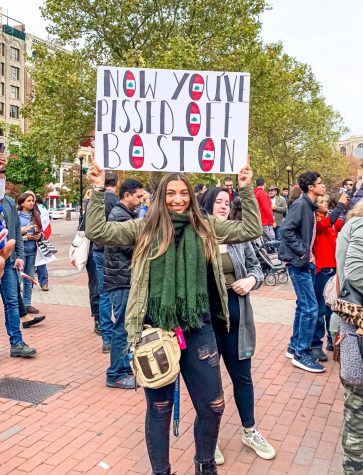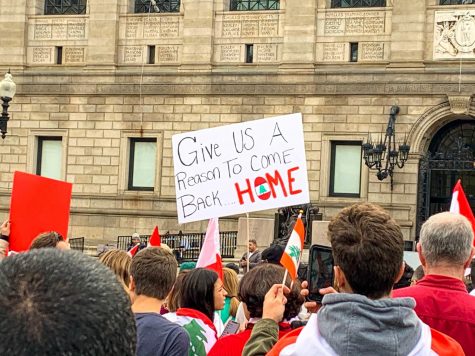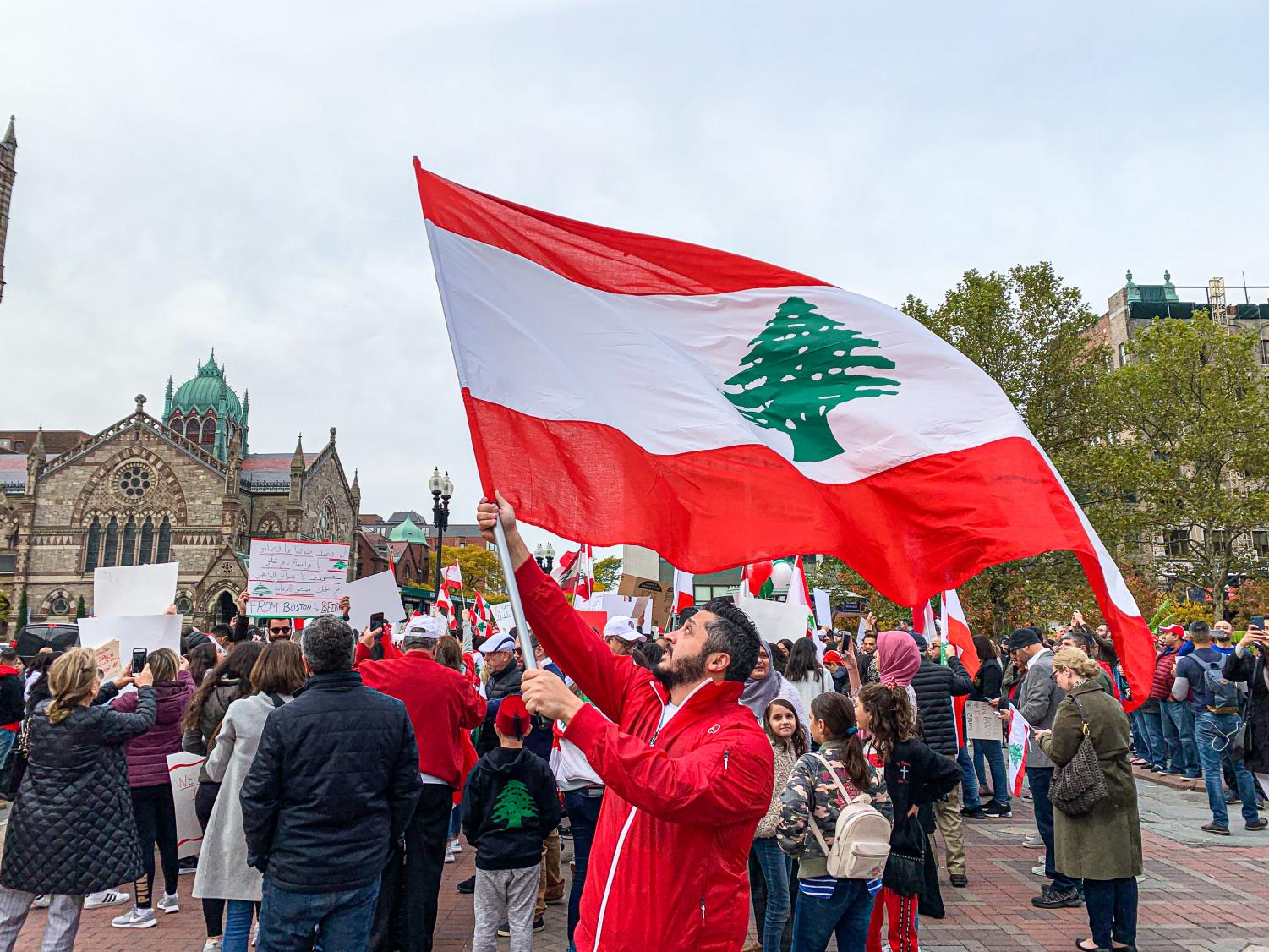Your donation will support the student journalists of Suffolk University. Your contribution will allow us to cover our annual website hosting costs.
Bostonians march in solidarity with protestors in Lebanon
October 23, 2019
Last Sunday, more than 100 members of the Lebanese community gathered in front of the Boston Public Library to march in solidarity with protesters in Lebanon demanding corrupt government officials to resign.

A sea of red and white Lebanese flags flew across Copley Square as people crowded the area to show their support. Supporters came with whole families, wearing face paint and clothing depicting national symbols.
Protestors held signs with messages saying “We stand with our people in Lebanon” and “Give us a reason to come back home.” A sense of community was clearly prevalent as people smiled and sang along with national music played through loudspeakers. The Suffolk Journal spoke to a variety of protestors to understand their perspective on the events in Lebanon.
“There is a big community of Lebanese that lives outside the country, that have grown up here,” said Nadim Chakroun, a young Lebanese man living in Boston. “We go back to visit, but we don’t really have a reason to go back because the country is so corrupt and the economic situation is not doing well.”
Suffolk students also attended the event and expressed their views.
“For years our students have been fleeing and the most intelligent and brightest students come from Lebanon,” said Karine Kanj, a government major and Suffolk junior, in an interview with The Suffolk Journal. “Seeing them fleeing, go to other countries and benefiting other countries is really sad.”

Current anti-government protests in Lebanon started on Thursday and have already forced four government officials to resign. However, tens of thousands of demonstrators have continued to rally, demanding the government fix the economy, according to Al Jazeera.
“People had enough. For more than 30 years it’s been the same faces all over. Same corrupt faces, same people stealing from the people,” said Joseph Dawaliby, a middle-aged man who has lived in Boston for 14 years.
One of the factors that caused a spike in protests was over-taxation. The government has implemented drastically high taxes for decades, causing an uproar across the nation, according to Al Jazeera.
“They want to charge people to use WhatsApp, which is a free app and they also want to put 15% taxes on everything, including bread,” said Joella Alzaibak, a student living in Boston. “The country already can’t afford these things without these taxes.”
Another one of the most significant problems facing the Lebanese community is the high rate of corruption that has been going on for years.
Lebanon is the 37th most corrupt nation out of 175 countries, according to the 2018 Corruption Perceptions Index by Transparency International.

“It’s been an ongoing issue. We’ve been dealing with corruption for a very long time,” said Asma Mardini, a Wellesley college sophomore studying economics and math.
Mardini believes that one of the most extreme examples of corruption was the recent wildfire in Lebanon. The government budget has been so severely depleted to the point where there was no money left to deal with the natural disaster and the nation had to rely on foreign help, according to Mardini.
Lebanon has also had ongoing problems with crucial infrastructure, such as water and electricity, according to ForeignPolicy.com. Many blame the corrupt government for that.
“We can have electricity, but [the government] doesn’t want to build power plants. They just want to grant money and create deals with other countries to profit off it and put the money in their pockets,” said Mardini.
Poverty has created an extreme divide in Lebanese society and has forced many people to leave their country, including those who protested Copley Square last Sunday.
More than 25% of Lebanese citizens live in poverty, according to the Borgen Project website, a non-profit organization dealing with poverty worldwide. This is even higher in some rural areas, where nearly 36% of citizens live in poverty.
“There is more Lebanese people outside Lebanon than inside of it,” said Mardini. “They are forced to leave because they can’t make a living in their own country.”
Mardini believes that due to the lack of opportunities for social mobility in the country, more Lebanese citizens flee their homes each year with hope of finding a better place in foreign countries.
“Lebanon itself already has a large gap between the rich and the poor. If you’re poor, you’re shimmy poor and if you’re rich, you have money to live comfortably,” said Sorella Alzaibak, Joella’s sister.

Despite corruption, economic crisis and poverty, many feel hopeful about the protests now happening in Lebanon. Many have been connecting these protests with the new generation of Lebanese people, both in the country and overseas.
“This is the role of youth to come up with new faces, no political orientation whatsoever. That’s what we need,” said Dawaliby.
Sorella Alzaibak believes that the Lebanese youth living in countries outside of Lebanon play a crucial role in the ongoing protests.
She explained that the youth are utilizing social media to spread important information about what happens in the country – something she feels is not talked about enough in the U.S.
The protest in Copley Square has strengthened the hope that Lebanese Bostonians have for a better future for their country and in themselves.
“We are the millennials and we are all about changes. It’s okay to break traditions if they’re wrong. We’re definitely the future of Lebanon,” said Joella Alzaibak.
